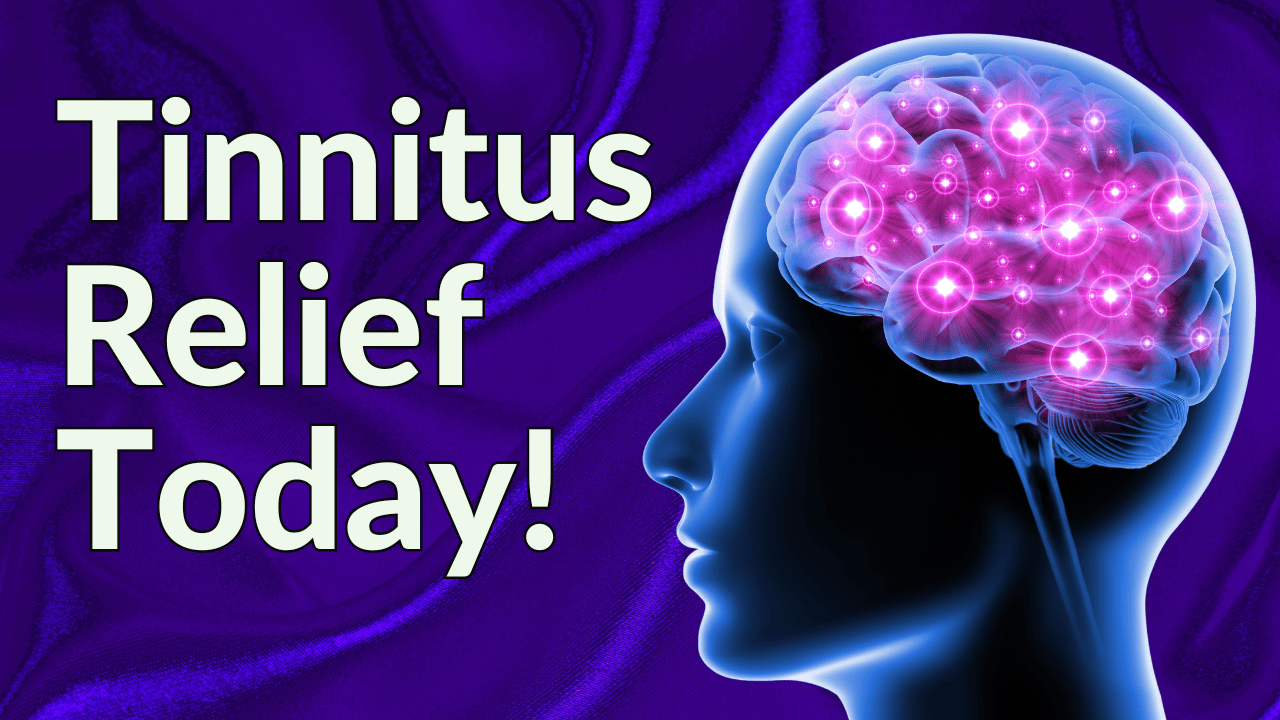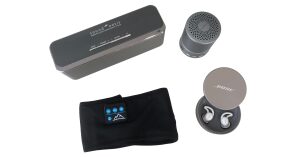These five tinnitus recovery essentials are valuable parts of your toolkit. If you practice these five tips, then you have a very high likelihood of getting better.
As an audiologist, I was not fully trained on holistic ways to manage tinnitus, and there isn’t much discussion in the audiology community about alternative methods to use besides hearing aids, sound therapy, and maybe cognitive behavioral therapy. Therefore, in my own journey as a doctor of audiology specializing in tinnitus, I’ve realized that this more holistic approach is the best opportunity to get better and get the best return on your investment of time and energy.
Dr. Thompson explains the essentials for tinnitus recovery
Five Essentials for Tinnitus Recovery
1. Self-soothing practices
We must have self-soothing practices such as sound therapy. When we talk about sound therapy, it’s usually a combination of using sound from a speaker in the room you are in, ear-level hearing devices, and being around natural sound as much as possible from nature. Try to avoid the situation of being in a quiet, isolated place.
"Treble Health helped me reduce my tinnitus by about 80%, and now I can live my life again!"


"Treble Health helped me reduce my tinnitus by about 80%, and now I can live my life again!"
– Steve D.
Book a free consultation to learn which Treble Health solution is right for you. Join Steve and thousands more who have found lasting tinnitus relief.
This has become more challenging during COVID because many of us are forced to stay home and there is not much sound stimulation in our everyday life. You can use sound as a therapy to counteract the sound of the tinnitus, and to create more time during your day where you can stay focused.
2. Sound therapy
Sound therapy typically breaks down into devices that are worn on the ear or sound that is played in your room, as well as phone apps or sound you can play from a phone. The brain does not distinguish between sound that is coming from a hearing aid, a speaker, or the natural world around me.
People often think that sound therapy has to be hearing aids and this is not true. The reason hearing aids are popular for sound therapy is because it’s sustainable to have something on your ears that you can directly control to play sounds only you can hear. Others do not have to hear sounds when they are coming directly into your ears. Sound therapy can move with you without having to carry a physical object like a white noise machine or the sound from your phone. But the auditory brain, which is the part of the system that benefits from sound therapy, does not distinguish between sound coming from a hearing aid versus sound coming from an iPhone or a Bluetooth speaker.
Having sound therapy can be very simple. It can be as simple as playing constant low-level classical music in the background. With sound therapy, the loudness of tinnitus can be more manageable. Using sound as therapy is part of getting better. It’s important not to forget or overlook this. When you are in quiet places with loud tinnitus and feeling anxiety, stress, and bothered by it, then having more background noise in your house is a good idea.
3. Mind-body practices
The third essential is mind-body practices. About three or four years ago when I started researching to find out who in the online tinnitus world is actually helping people get better, I became friends with all the tinnitus experts. They have created online courses, YouTube channels, and written books. I tried to find the common ground between all of these professionals, because even though we have slightly different perspectives and approaches, there is a lot of common ground. A big part of that is mind-body practices such as yoga, meditation, and anything else that can bring us into a present state of mind and calm us. Mind-body practices may give you some power and control back, instead of being helpless and relying on someone else to help you. Some consistency with mind-body practices, like a guided meditation, a guided breathing exercise, gentle yoga or Tai chi can slow down the pace of the mind and reduce any anxiety or stress that’s built up around the tinnitus. The physical body and the nervous system can become calmer as well.
4. Calming the mind
The fourth essential is that we must calm the mind as much as possible, and this can be challenging. When I’m feeling anxiety and trying to calm my mind, it can be really hard to do it on my own. Sometimes I need someone else to help me. This might be a good opportunity to join a support group, an online positive community, or to work one-on-one with a therapist or a tinnitus coach of some sort. Anything that can calm the mind is going to be beneficial.
What I’ve found is that the mind can create stories, worries, and fears about tinnitus. It can be beneficial to take a catastrophic thought, such as “ Is my tinnitus going to get louder? Is the rest of my life going to feel like this?
This is one example of a catastrophic thought about the future with tinnitus. When we unpack it, consult professionals, and get some facts then the thoughts can lose their power. This may enable the mind to understand that worries or fears about tinnitus are not as real as you once believed. That’s an example of how calming the mind can improve life with tinnitus.
5. Shift your attention from tinnitus to other things in your life
The fifth essential for recovery and getting better is to shift your attention from tinnitus to other things in your life. Try not to over monitor your symptoms, try not to keep a detailed journal of how loud your tinnitus is in the morning, in the afternoon and in the evening. Try not to hyper focus on the sound itself. If you’re having a day when it spikes, then it can be beneficial to just say: “My tinnitus is loud today, but I’m going to focus on whatever else I would typically do in my day.” This could be reading, listening to an audio podcast, an audio book or taking time to be social and do other things that are not related to tinnitus. This way, you are moving your attention and emotional energy away from tinnitus. That’s one example of how shifting your attention to other things in your life can be beneficial.
Of course, right now, during COVID, it’s hard to do things. It’s hard to have social groups. Let’s think about what you can do now to shift your attention from tinnitus to other things. Perhaps this means picking up an old hobby that you really enjoyed that you can do indoors. Maybe this means watching new movies – anything that can shift our attention away from tinnitus.
Next Step: Book Free Consultation
- 75% of patients reduced their tinnitus within three months after following our recommendations.
- "I feel like Treble Health literally gave me my life back." - Randy S. (verified customer)
- Join thousands of people who have reduced their tinnitus after scheduling a free consultation.


















